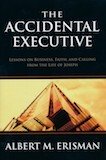Prefiguring the Trinity
Daily Reflection / Produced by The High Calling
He came and preached peace to you who were far away and peace to those who were near. For through him we both have access to the Father by one Spirit.
Ephesians 2:17-18
One of the most common objections to orthodox Christian faith goes something like this: "My big problem with Christianity is the Trinity. This doctrine just doesn't make sense to me. It was made up by Christians centuries after Christ. And, besides, you can't even find it in the Bible." When the faithful hear this, sometimes they run to a Bible concordance or app, sure that "Trinity" must be in Scripture. But their word search comes up short. "Trinity" is not in the Bible after all. Is the objector right after all? Is a Trinitarian view of God extra-biblical or even unbiblical?
Yes, it's true that Trinitarian theology was worked out in the fourth and fifth centuries A.D. And, yes, it's also true that the word "Trinity" does not appear in Scripture. ("Trinity," by the way, is an English form of the Latin word trinitas, which means "triad" or "threesome.") But this does not mean that roots of Trinitarian theology do not grow deeply into the pages of the Bible.
Ephesians 2:17-18 provides a salient example of the soil from which a Trinitarian view of God grew. Verse 17 says that "he came and preached peace." The context makes abundantly clear that "he" refers to Christ (2:13-16). Notice how the passage continues: "[Christ] came and preached peace ... For through him [Christ] we both [Jews and Gentiles] have access to the Father by one Spirit" (2:17-18). Though the text does not literally say, "God is a Trinity: Father, Son, and Holy Spirit," it certainly points in this direction. We are reconciled to God (2:16) through Christ and by the Spirit, thus gaining access to the Father.
I am not suggesting that this passage alone proves the truth that God exists in three persons. But I do want to make clear the fact that a Trinitarian view of God is not some late addition to authentic Christianity. Rather, it is a clarification of that which is taught in many passages of Scripture, including Ephesians 2:17-18. I mention this here because, in a world that increasingly objects to the core Christian beliefs, it's important for all believers to be able to explain and defend their faith in a way that is true, bold, respectful of others, and humble.
Why humble? Because no matter how much we find evidence for the triune nature of God in Scripture, and no matter how deeply we understand the Trinity, we will never fully grasp the mystery of God's nature. When it comes to the Trinity, we see today through a glass darkly. Nevertheless, we can be confident in what Scripture reveals to us, even as we wait for a fuller understanding that is yet to come.
QUESTIONS FOR FURTHER REFLECTION: Have you ever heard anyone say that the Trinity is not found in Scripture? How did you respond to this objection to orthodox Christian faith? What helps you to believe that God is, indeed, one God in three persons: Father, Son, and Spirit?
PRAYER: Almighty God, thank you for making yourself known to us in history, in our experience, in your church, in Scripture, and most of all, in Jesus Christ. Thank you for helping us to glimpse the reality of your triune nature. You know, however, that we are limited in our understanding. Sometimes our limitations cause us to doubt or feel insecure when our faith is challenged. Help us, dear God, to know you with confidence and truthfulness, but also with humility.
All praise be to you, O God, Father, Son, and Holy Spirit. Amen.
Image courtesy of Laity Lodge, one of our sister programs in the Foundations for Laity Renewal.






